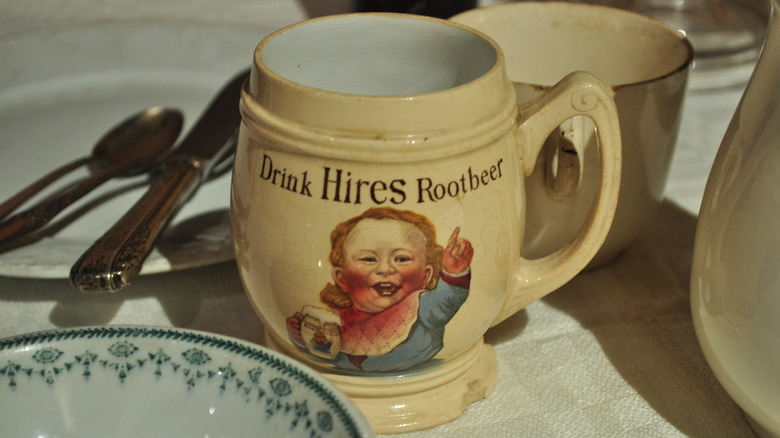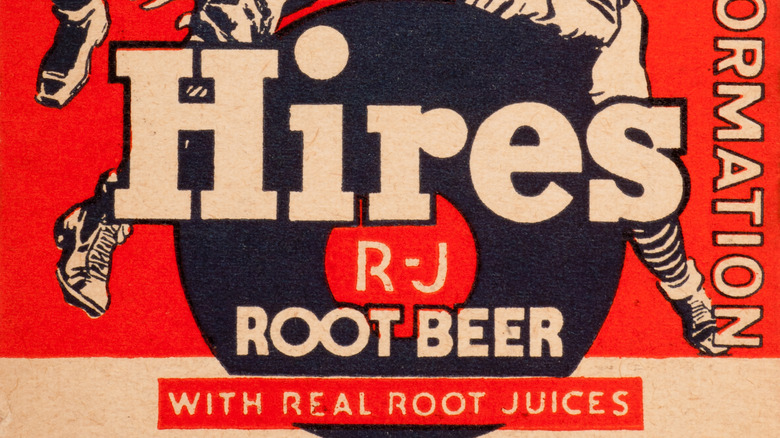How Root Beer Began Its Life As A Tea Blend
Root beer is quintessential Americana, evoking wholesome images of summer birthday parties and vintage diners. Yet, while we're all familiar with root beer, it is oddly difficult to define. ThoughtCo. explains that there is no strict definition for root beer, and throughout its history, the drink has been made from a wide array of ingredients including allspice, ginger, wintergreen, hops, vanilla beans, molasses, and licorice, just to name a few. Traditionally, the "root" in its name referred to sassafras, but this is no longer the case since the FDA banned sassafras due to concerns that a compound it contains called safrole was carcinogenic. The validity of this fear has since been questioned, but the ban on safrole persists. Consequently, McGill University notes that most root beer is now made with artificial or safrole-free sassafras.
Pinpointing the exact origins of root beer is also difficult, as it seems to descend from a variety of other drinks. According to ThoughtCo, indigenous Americans made medicinal beverages from sassafras roots. Meanwhile, Europeans were making something called "small beer," which is a type of low-alcohol beer made from herbs, bark, and berries (via Renegade Brewing). Early American colonists likely took the ingredients popularized by indigenous peoples and combined them with their own knowledge of small beers to create the forerunner of modern root beer. However, root beer would not be commercialized, or even known by its familiar name, until a 19th pharmacist got inspired by a cup of tea.
Charles Hires commercialized root beer
Charles Elmer Hires seemed destined for a life in pharmacy. Philadelphia Magazine reports that Hires, born in 1851, developed an interesting hobby around the age of six or seven. He would collect discarded bottles and fill them with colorful liquids he concocted from various plants. These he would display in a pretend pharmacy that he made for himself. His parents decided that since little Charles seemed so interested in chemistry, he should make a career out of it as soon as possible. So, when he was just 12 years old, his parents sent him off to apprentice with his brothers-in-law, who were both pharmacists.
Hires' fate forever changed while honeymooning in his native New Jersey. According to ThoughtCo., it was there that Hires sampled an herbal tea that he loved so much that he got the recipe to take home with him. Per Sprecher Brewery, Hires worked with two college professors to turn the ingredients for this tea into a shelf-stable powder for commercial production. This dry tea could actually be transformed into something close to modern root beer, but ThoughtCo notes that consumers first had to mix it with water, sugar, and yeast to induce natural carbonation via fermentation. It wasn't exactly convenient, and Hires' friend Russell Conwell (who just so happened to be the founder of Temple University), suggested he make a liquid version to be mixed with soda water. Hires' original recipe reportedly contained 25 different herbs, berries, and roots.
The name 'root beer' was chosen as a marketing ploy
When Hires finalized his formula, it was money-making time. Philadelphia Magazine reports that he originally planned to sell the beverage under the name "Hires' Root Tea." However, his old pal Conwell observed that "Our hard-drinking miners in central Pennsylvania will never touch a drink labeled 'tea,'" and suggested that Hires change the name to "Root Beer." It was, of course, a brilliant idea. As grateful as we are for Hires' enterprising spirit, it's strange to think that, without Russell Conwell, we could all be drinking root tea floats. Hires' make-or-break moment came in 1876 when he took his product to the Philadelphia Centennial Exhibition. According to ThoughtCo., this was the first time root beer was sold to the public and, fortunately for Hires, it proved extremely popular.
Philadelphia Magazine makes note of Hires' marketing prowess. He launched an aggressive advertising campaign for root beer, utilizing magazines, newspapers, and collectible cards to promote a product he called "the greatest health-giving beverage in the whole world." Renegade Brewing adds that Hires capitalized on the Temperance Movement by promoting root beer as an alternative to alcohol. However, Philadelphia Magazine notes that the Women's Christian Temperance Union once called for a boycott of root beer after a chemist found it contained trace amounts of alcohol. Hires responded with such aggressive advertising that the WCTU backed down, and root beer has surged steadily ever since.


